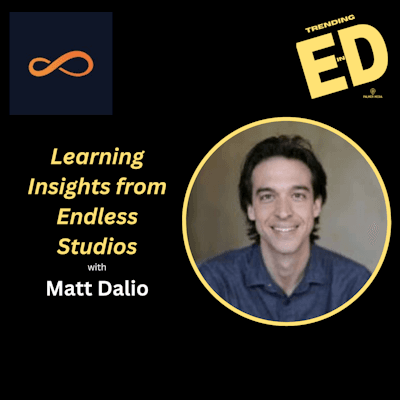Matt Dalio, founder and CEO of Endless Studios, joins host Mike Palmer to explore the profound connection between games, technology, and workforce development. Matt, who grew up with an early global perspective—including a transformative year in China at age 11—brings his philanthropic drive to the world of scalable tech solutions.
We dive into how Matt’s company, Endless, initially focused on providing computers in emerging markets, realized that skills are what truly pay the bills. A simple math game, Tux Math, engaged students in a way traditional instruction could not, with classrooms full of kids shouting multiplication tables. The even bigger revelation? Many top tech entrepreneurs, including Elon Musk and Mark Zuckerberg, started by hacking their games.
Matt asserts that the goal is to transform kids from consumers to creators. We discuss how game creation, using tools like Unity and GitHub, develops five core, high-value disciplines: coding, design, digital art, management (product/project), and marketing/business analysis. These skills translate directly into a modern, AI-augmented workforce, where the ability to architect and validate production software is crucial.
Key Takeaways:
- From Consumption to Creation: We need to move young people from passively using smartphones (consumption devices) to actively creating with devices that have a keyboard and mouse (creation devices), fostering a “lean forward” mindset.
- The Power of Hacking and Games: Learning starts when it becomes more fun to hack your games than to play them, leading to the development of deep, technical understanding.
- Five Core Disciplines: Game design is a launchpad for learning highly employable, durable skills in coding, design, digital art, management, and go-to-market business analysis.
- A New Model for Learning: The future of education involves immersing students in real projects on collaborative platforms like GitHub, replicating the workforce environment to teach mindsets like autonomy, agency, and teamwork.
- AI and the Future Developer: AI is a powerful tool, but it demands new skills: prompt engineering, chaining agent tools, and knowing how to architect, read, and debug production-level code to avoid technical “slop” and security issues.
Why You Should Listen:
The gap between traditional education and the demands of the AI-driven workforce is wider than ever. You’ll hear Matt’s global perspective on the rising number of high school students choosing not to pursue costly college degrees and the hunger for education in emerging markets. We discuss how the allure of video games—where the average kid spends 10,000 hours by graduation—can be channeled into productive, skills-building creation time. Matt shares an example of a Peruvian student who used his new skills to build a video game for rural communities to preserve their local language, illustrating the real-world, positive impact of this new educational approach. Listen to understand the model that could prepare the next generation to be “superhumans empowered by AI”.
If you liked this conversation, be sure to like, follow, and share Trending in Ed wherever you get your podcasts.
Ray Dalio’s books referenced in the conversation: Principles: Life and Work and How Countries Go Broke: The Big Cycle
Timestamps:
- 00:00 Introduction and Guest Welcome
- 00:57 Matt Dalio’s Early Life and Influences
- 02:58 Journey into Technology and Philanthropy
- 04:07 The Power of Games in Education
- 06:39 Skills vs. Mindsets in the Workforce
- 11:10 Preparing for the Future Workforce
- 13:58 Global Challenges and the Future of Jobs
- 15:51 The Declining Value of Education
- 17:01 Global Perspectives on Education
- 18:52 The Power of Community and Mentorship
- 20:47 Learning Through Game Development
- 24:50 AI and the Future of Work
- 28:47 Encouraging a Maker’s Mindset
- 31:29 Concluding Thoughts and Takeaways
Palmer Media 2025-11-18 10:00:00
Source link

